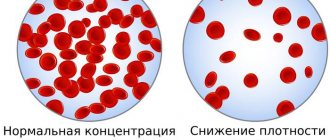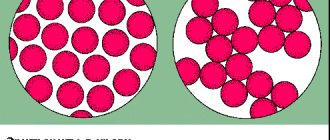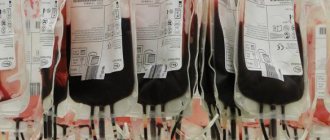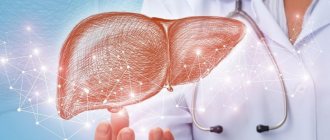Classification of human blood, depending on the main characteristics, is of practical importance; it allows you to select the ideal donor for transfusion and transplantation; this knowledge is necessary for planning pregnancy and establishing the fact of paternity. The rarest blood group in humans is IV negative, which is considered unique because it has a number of features.
Detailed description of the study
The formed elements of human blood - red blood cells - may have some markers on their surface, called antigens.
There are two main such antigens - A and B. Based on their presence, 4 blood groups are distinguished: O(I) - absence of antigens A and B on the surface of the cell A(II) - antigen A is present on the surface of the erythrocyte B(III) - present on the surface of the erythrocyte antigen B AB (IV) - both antigens are found on the surface of the erythrocyte
These antigens have no physiological role, but determine the compatibility of blood during transfusion. When incompatible blood is transfused, an immune reaction of rejection of the foreign protein develops, which leads to the destruction of red blood cells - hemolysis.
Another marker of blood compatibility during transfusion is the Rh factor. This is a protein that is produced in 85% of Caucasians and 99% of people of the Mongoloid race. It is present on the surface of red blood cells, but does not play a significant role in the life of the body.
When blood containing the Rh factor enters the bloodstream of a person who does not have this protein on the surface of red blood cells, the human immune system perceives it as foreign. As a result, hemolysis develops. Therefore, blood transfusion requires taking into account compatibility not only by blood group, but also by the Rh factor.
It is especially important to know your Rh status for women planning a pregnancy. If a woman with no Rh factor becomes pregnant with an Rh positive man, there is a chance that the child will also have an Rh factor.
In such a case, antibodies to the Rh factor may appear in the mother, which will cause hemolysis of the fetus, which is called Rh conflict. The formation of these antibodies can occur when fetal blood enters the mother's bloodstream. Factors that increase the risk of Rh conflict are:
- Complications of a previous pregnancy in the early stages (ectopic pregnancy or its termination);
- Abdominal injury during pregnancy;
- Vaginal bleeding during pregnancy;
- Medical interventions during pregnancy that require the removal of cells or fluid from the amniotic sac, such as amniocentesis and chorionic villus sampling.
With increasing gestational age, the risk of developing Rh conflict increases. Its appearance in the first trimester leads to missed pregnancy and its early loss; in the case of late Rh conflict, premature birth is possible. The newborn has hemolytic jaundice, which is accompanied by damage to internal organs and requires treatment.
It is important that antibodies to the Rh factor take time to form. Often the first pregnancy with Rh conflict proceeds favorably, since the immune system is just beginning to produce antibodies. The risk of complications in the second and subsequent pregnancies is much higher.
Studying your blood group and Rh factor helps you avoid complications associated with blood transfusions. With regard to the Rh factor, its determination is also important for assessing the risk of Rh conflict during pregnancy.
Theory of origin
There are several theories about the emergence of different groups. According to one of them, at first all people on Earth had one, the rest appeared as a result of mutations, which is associated with a change in lifestyle.
The oldest is the first. The ancient people who hunted had it. Today it remains the most common on the planet.
The second appeared when a person’s diet changed: they stopped eating raw meat and added greens, roots, and plant fruits to their diet.
The third originated in Asia. Her education is also associated with the diet in those regions: milk and meat from livestock.
The youngest and rarest blood group is the fourth. It is believed that it appeared not due to changes in human conditions, but as a result of the fusion of species A and B in mixed marriages of Indo-Europeans with Mongoloids. Supposedly, she is only 1000 years old.
Who should donate blood?
Medical sources say that it is always preferable to transfuse a person with blood of the exact group of which he is a carrier. Therefore, it is very important that blood banks have all types of blood.
The main rule of blood transfusion is that people with positive blood can be given negative blood. If done the other way around, the person who needs the transfusion will die. This is due to the biological characteristics of the antigen-antibody system.
Although type 1 is considered rare, its uniqueness lies in the fact that in emergency cases such people can be transfused with blood of any type, provided that the Rh factors are compatible. At the same time, other types of blood are not so universal.
Group AB can only be transfused to people with the same blood type.
No matter what kind of blood you have, by donating it you will help save a person’s life. The most expensive and sought after blood is Rh negative. If you are one of the 15% of people who carry it, be sure to think about the possibility of becoming a donor. Periodic blood donation is not only charity, but also a way to improve the functional state of your hematopoietic system.
When can immunoglobulin prophylaxis be carried out?
To prevent conflict in subsequent pregnancies, women with a negative Rh factor should undergo prophylaxis. This is done after:
- childbirth (within three days);
- abortion;
- analysis of amniotic fluid;
- spontaneous miscarriage;
- ectopic pregnancy;
- placental abruption;
- transfusion.
Remember: if you and your baby’s group and Rh are different, this is not an indication that there will definitely be problems. Group and Rh are just the presence or absence of specific proteins in the blood. The reaction of the body and the development of pathologies in our time can be successfully controlled with the help of medications. Your attentiveness to your body, as well as an experienced doctor, will help you bear a healthy baby.
What determines the rarity of a blood group?
The rarity of blood groups, like many other features of our body, depends on natural selection. The fact is that throughout the entire two-million-year history of mankind, people have had to adapt to new conditions of existence.
The climate changed, new diseases appeared, and our blood developed with them. The oldest and most common group is the first. Scientists believe that it was she who was the original, and all the groups known today came from her.
Rare groups appeared much later, so they are not so common in the population.
Diet for "new people"
So, for the 4th negative, fish, any kind, sea and river, serves as the main source of protein, but preference is given to mackerel, tuna and pike.
- Meat. Mutton or lamb, they also recommend venison, but where to get it.
- Fermented milk products - any are welcome. They should be on the table almost every day.
- Vegetables and mushrooms are great. The most useful are kale and onions. Soy and bean curd - tofu - excellent. The main source of vegetable beans.
- Be careful with buckwheat, corn, and red meat.
- Limit consumption of beef, whole milk and milk products; pomegranates, pineapples, bananas.
The rarest blood
Thus, group IV is the least common. Which blood type is the rarest based on the Rh factor? Again, the fourth one is negative. On Earth, approximately 0.4% of people have such blood, that is, one person out of 200 thousand. It is unevenly distributed across the planet. For example, in China such people make up only 0.05% of the population.
The youngest and rarest group in the world is the fourth
The fourth positive is much more common than the negative. If we talk about the prevalence in the world, then its carriers are about 5% of the population. This figure may be different in some countries. About 7% of residents of Turkey, China, Israel, Finland, and Poland have such blood.
Rare ones include the third negative - about 1.5%, the second negative - 3.5%, the first negative - 4.3%.
Which blood type is susceptible to coronavirus?
Chinese scientists thoroughly studied the test results of 2,173 patients in the cities of Wuhan and Shenzhen. The remains of 206 people who died from coronavirus were also studied.
The conclusion is clear: among the sick people, most of them are people with group II (they get coronavirus infection 1.2 times more often). Patients with blood group IV died less often. Among healthy people, most people are in group I. They get sick 1.3 times less often.
Research results show that the first blood group is most resistant to coronavirus. You can find out more about coronavirus in another article -.
Rh factor and pregnancy
Compatibility of Rh factors during pregnancy is one of the tests that is carried out in the antenatal clinic. When a woman registers with a gynecologist, she will need to donate blood to determine her group and Rh factor. It can significantly affect the course of the next nine months. If the baby inherits the positive Rh of the father, and the mother has a negative Rh, then the protein in the child’s blood is unfamiliar to the mother’s body. The mother's body "considers" the baby's blood a foreign substance and begins to produce antibodies, attacking the baby's blood cells. If there is a Rhesus conflict during pregnancy, the fetus may experience anemia, jaundice, reticulocytosis, erythroblastosis, hydrops fetalis and edematous syndrome of the newborn (in the latter two cases there is a high probability of death of the child).
Risks during pregnancy
Unlike representatives of other groups, those women who have fourth positive blood may not worry about blood group conflicts during pregnancy. The only recommendation for these women is to check Rh compatibility. If a woman has a positive blood type 4, there is no risk of conflict. If, on the contrary, the risks for such patients are no higher than for representatives of other blood groups. It must be remembered that a Rh conflict can only arise when women have negative blood, and men have Rh positive blood and the child is Rh positive.
Historical rationale for different blood groups in humans
Blood grouping is determined by the millennia-long evolutionary stage of development of the immune and digestive systems.
It is the result of humanity’s adaptability to these natural factors. All our ancestors, according to the theories of many scientists, had the first blood group. Their digestive system was adapted to digest a “meat diet”. This has also affected modern man.
People with the “0” group have higher acidity and are more often susceptible to peptic ulcers. The remaining species appeared through a process of mutation caused by an increase in population, changes in the environment and difficulties in obtaining meat food. The gradual transition to vegetable protein provoked the formation of the second – “A” group.
The properties of the ability to adapt to life in society, a non-aggressive character and people's contact, are laid down at the genetic level. The predominance of representatives of the “A” gene in Europe is due to the migration of ancient peoples. It was this gene that helped them survive during cholera and plague in the Middle Ages.
The Himalayas are the birthplace of the “B” gene, present-day Pakistan and India. Raising livestock and consuming dairy products has become another evolution in the digestive system. The harsh climate contributed to the development of patience, determination and equanimity of character.
The youngest in the Ab0 System is group “AB” (fourth). Appeared when the second and third were mixed. She is unique. Its owners have high hereditary protective immunity, which provides resistance to allergic and autoimmune pathologies.
Japan has developed certain trends that are a calling card when hiring. A certain blood type is an indicator of character, determination, organization, hard work, organizational and diplomatic abilities.








